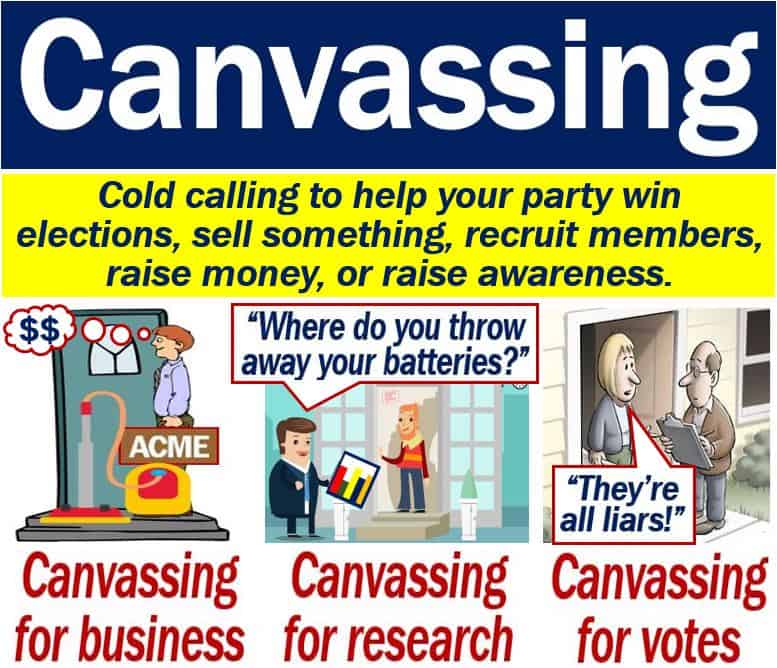Canvassing involves making direct contact with members of the public for political campaigns or research purposes. People may also canvass to raise funds, sell something, promote awareness, or as part of a membership drive. The police might canvass an area near a crime scene. In other words, they go door-to-door asking people whether they saw something, heard something, etc.
Put simply; canvassing means cold calling, i.e., visiting people without any prior arrangement. In other words, a canvass call is an unsolicited call.
Cold calling may occur door-to-door or via telephone.
When marketing professionals need to gather and analyze data for market research, they may send out teams of canvassers.
Canvassing during election campaigns
During an election campaign, political parties send out teams of canvassers to talk to people. They knock on doors and ask how they intend to vote.
Although most people think that the campaigns aim to convince people to vote one way, this is not usually the case.
Parties typically organize canvassing campaigns to make sure their loyal voters come out to vote. If two leading candidates are running neck-and-neck, voter turnout will usually decide who wins.
In other words, the winning party is the one that managed to get the best voter turnout.
Convincing people at their doorstep to change sides is virtually impossible. It would be a waste of resources to send out teams of canvassers to get people to switch.
Canvassers will, however, remind loyal voters who have doubts and perhaps some independents (UK: floating voters) about the candidate’s priorities. They receive training on how to answer certain questions.
Reminding your voters to come out on the big day pays off. If you can get as many of your people to get down to the voting booth, your chances of winning an election improve significantly.

Although people and organizations may organize canvassing campaigns for different reasons, they all have one thing in common. Nobody knew they were coming, i.e., they are unsolicited calls.
Canvassing to boost sales
For some businesses, cold calling door-to-door or via the telephone makes sense. If a tree surgeon is trimming or chopping down a tree, knocking on neighbors’ doors is a good way of getting more business.
Not only can the neighbor see a ‘sample’ of the tree surgeon’s work, but they can also contact the customer directly. They can contact the customers because he or she is a neighbor.
Window-cleaning companies also canvass up and down streets.
There are some products which respond well to door-to-door cold calling. In the UK, double glazing (USA: double-paned window) salespeople swear by it.
Sales teams sometimes organize themselves into ‘openers’ and ‘closers.’
The openers canvass for appointments, while the closers visit those appointments and try to get their prospects to buy. A prospect, in this context, refers to somebody who I believe could turn into a customer.
In other words, one person ‘opens’ the door, while the other tries to ‘close’ the sale. In this type of sales team, the openers do the canvassing.
Selling encyclopedias door-to-door
Before the Internet existed, knocking on people’s doors was a good way of selling encyclopedias. Encyclopedia Britannica, for example, once made most of its sales from door-to-door canvassing.
Today, however, we all use online sources such as Wikipedia when we want to look up something. Apart from being much more convenient and up-to-date, Wikipedia and other sources are also free.
During the 20th century, door-to-door canvassing was much more popular for salespeople than it is today.
In the 1950s and 1960s, there were huge teams of door-to-door vacuum cleaner salespeople. Some of them became rich, simply by knocking on doors and making persuasive presentations in people’s homes.
Door-to-door vacuum salespeople still exist, but in much smaller numbers than fifty years ago.
Spelling – canvass vs. canvas
The words canvas and canvass are homophones, i.e., they sound alike. However, their meanings are different.
‘To canvass’ is a verb. It means to solicit opinions, orders, votes, contributions, etc.
The noun ‘canvas’ refers to a closely woven cloth that we use for tents, sails, or oil paintings.
